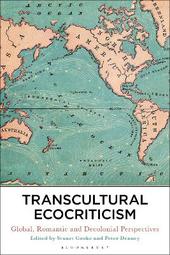
|
Transcultural Ecocriticism: Global, Romantic and Decolonial Perspectives
Hardback
Main Details
| Title |
Transcultural Ecocriticism: Global, Romantic and Decolonial Perspectives
|
| Authors and Contributors |
Edited by Dr Stuart Cooke
|
|
Edited by Dr Peter Denney
|
| Physical Properties |
| Format:Hardback | | Pages:304 | | Dimensions(mm): Height 234,Width 156 |
|
| Category/Genre | Literary theory |
|---|
| ISBN/Barcode |
9781350121638
|
| Classifications | Dewey:809.9336 |
|---|
| Audience | | Tertiary Education (US: College) | |
|---|
| Illustrations |
10 bw illus
|
|
Publishing Details |
| Publisher |
Bloomsbury Publishing PLC
|
| Imprint |
Bloomsbury Academic
|
| Publication Date |
11 February 2021 |
| Publication Country |
United Kingdom
|
Description
Bringing together decolonial, Romantic and global literature perspectives, Transcultural Ecocriticism explores innovative new directions for the field of environmental literary studies. By examining these literatures across a range of geographical locations and historical periods - from Romantic period travel writing to Chinese science fiction and Aboriginal Australian poetry - the book makes a compelling case for the need for ecocriticism to competently translate between Indigenous and non-Indigenous, planetary and local, and contemporary and pre-modern perspectives. Leading scholars from Australasia and North America explore links between Indigenous knowledges, Romanticism, globalisation, avant-garde poetics and critical theory in order to chart tensions as well as affinities between these discourses in a variety of genres of environmental representation, including science fiction, poetry, colonial natural history and oral narrative.
Author Biography
Stuart Cooke is Senior Lecturer in Creative Writing and Literary Studies at Griffith University, Australia. Peter Denney is Senior Lecturer in History at Griffith University, Australia.
ReviewsContaining essays predominantly by Australians but including scholarship from around the Pacific Rim and beyond, Transcultural Ecocriticism illuminates the environmental dimensions of literary works from Vietnam, Mozambique, China, the U.S., Chile, Britain, and India, as well as Australia, with generous representation of Indigenous cultures. The genres considered are also diverse, as the authors examine the resources for environmentalism and environmental justice of fables, fantasy, science fiction, oral traditions, travel writing, novels, and poems. The thinking here is indeed transcultural, linking carefully situated knowledges to one another as well as to global concerns and planetary responsibilities. Such bringing together of localized particularities with large-scale thinking about global crises, deep time, and planetary space is precisely what's needed in the environmental humanities now. A section of essays on Romanticism valuably highlights intersections of Romantic thinking about nature with colonial oppression, while another cluster of essays explores recent decolonial projects. Several of these present groundbreaking transcultural collaborations between Anglo-Australian and Indigenous (Aboriginal, Mapuche) artists. These exciting projects demonstrate the transformative and liberatory potential of opening to the eco-philosophies of other cultures. As readers of this important collection are introduced to works and traditions of literature they had not previously known, they will gain appreciation for the powerful resources offered by transcultural ecocriticism, especially those in which Indigenous onto-ecologies are at play, for responding, as Peter Minter observes, "to climate change and, among other things, its liability to regimes of coloniality." * Lynn Keller, Emerita Professor of English and Martha Meier Renk Bascom Professor of Poetry Emerita University of Wisconsin-Madison, USA *
|